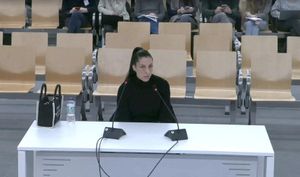Irina Bezrukova has made headlines after responding to the comments made by Tatyana Brukhunova, the wife of comedian Evgeny Petrosyan, who recently criticized women for purchasing fake branded handbags. Brukhunova expressed her disdain for those who opt for counterfeit luxury items, urging them to only buy what they can truly afford. Her remarks were met with swift backlash, particularly from Bezrukova, who reminded Brukhunova of her humble beginnings.
During her appearance on the NTV program "You Won't Believe It!", Bezrukova firmly addressed Brukhunova's comments, stating, "Good if you can afford a Bentley. But there are people who will never own a car. Don’t flaunt it to them. It’s not intelligent." This statement encapsulated the essence of the criticism—wealth often creates barriers and misunderstandings between social classes.
Tatyana Brukhunova's original comments came after she shared observations on social media about young women she saw with fake Hermes bags, one of which she claimed even had misspelled branding. "It's very funny," she concluded, indicating her belief those women should aspire to authenticity rather than purchasing fakes. She asserted it was necessary for consumers to practice financial responsibility and only acquire what they can afford.
Contrary to her intention, Brukhunova's comments sparked outrage among numerous public figures and social media users. Irina Bezrukova, known for her cultivating remarks and elegant demeanor, wasn’t the only celebrity to respond. Other artists stepped up to voice support for everyday consumers who may not have the financial means to purchase high-end designer products. Katera Gordon sharply noted, "At one point, I wanted to have some brand written on my clothes too," reflecting on her past experiences with replicas—a sentiment echoed by many who recalled their previous struggles.
Riza Syabitova, another well-known figure, expressed dissatisfaction with Brukhunova’s comments, stating bluntly, "She behaves poorly. You need to understand this." This pointed critique highlighted the disconnect perceived by many between affluent individuals and the average Russian consumer, particularly as economic insecurity increases among various demographics.
Social media users quickly joined the conversation, reinforcing Bezrukova's and Gordon's viewpoints about the gap between reality and Brukhunova's statements. Many lamented how luxury has branded society's perception, and not everyone is afforded the luxury of choice when it concerns financial survival, let alone fashion aesthetics.
The incident has triggered broader discussions about consumerism, financial privilege, and empathy. With countless individuals facing unprecedented economic challenges, the luxury goods sector remains a point of both aspiration and contention. Brukhunova's remarks, though intended to provoke, have instead illuminated the disparities inherent within socio-economic classes and the need for increased sensitivity surrounding such discussions.
Through her response, Bezrukova has not only defended the masses who may opt for fakes but has also inspired dialogue about genuine fashion, status, and the realities of financial life for average citizens. The cohesion of celebrity feedback signals solidarity against classism and the pitfalls of shallow materialistic aspirations.
Overall, this controversy not only highlights the challenges of cultural expectations but also demonstrates how fashion can act as a catalyst for significant social conversation. Bezrukova's stance against Brukhunova's initial comments reflects more than just backlash—it mirrors society's growing awareness of economic realities and serves as a reminder of the importance of humility and community.



